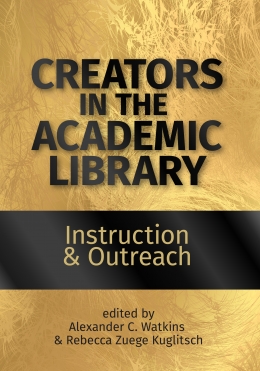Primary tabs
You don't need to be an ALA Member to purchase from the ALA Store, but you'll be asked to create an online account/profile during checkout to proceed. This Web Account is for both Members and non-Members. Note that your ALA Member discount will be applied at the final step of the checkout process.
If you are Tax-Exempt, please verify that your account is currently set up as exempt before placing your order, as our new fulfillment center will need current documentation. Learn how to verify here.
- Description
- Table of Contents
- About the authors
Engineering students, designers, studio artists, and other student creators have unique research needs that libraries are well-positioned to meet. They use academic literature to inspire and ground creation, but also seek information from trade literature, patents, technical standards, and how-to manuals. They apply tacit knowledge and need to learn not only how to write within academic discourse but also create objects, designs, and experiences.
In four parts, Creators in the Academic Library: Instruction and Outreach explores how to teach specifically for creator research, motivate learning, and deepen students’ understanding of their own practice.
- Technology, Tools, and Techniques for Creation
- Inspiring Creativity through Research
- Creator’s Unique Information Needs
- Grounding Creation in Research
Chapters are grouped by learning objectives rather than discipline to highlight the throughlines that unite creators regardless of their field. They include methods for researching creative technology, tools, and techniques in different settings and disciplines; how to research for inspiration; adapting our tools and teaching to the unique information-seeking behaviors of creator disciplines; and how these skills can be transferred to students’ future careers. Creators in the Academic Library offers learning strategies and objectives that can help you teach all manner of creators.
Volume 1
Contents
Acknowledgements
Series Introduction
Rebecca Zuege Kuglitsch and Alexander C. Watkins
Volume 1 Introduction
Alexander C. Watkins
Section 1. Technology, Tools, and Techniques for Creation
Chapter 1. Remixing Library Instruction: Supporting Creative Inquiry through Critical Digital Making
Oscar Keyes and Kelsey Sheaffer
Chapter 2. Creative Research and Digital Visual Literacy: Teaching Students to Search for Images Online
Giana Ricci
Chapter 3. Teaching Creators with Instructional Exhibitions: A Case Study on Zine and Book Structures
Yuki Hibben
Chapter 4. Sites of Practice: Web Building for Arts Students and Practitioners
Danielle Reay
Chapter 5. The Web is Your Canvas: Academic Libraries as Spaces for Web Development Programming Workshops
Carmen Cole
Section 2. Inspiring Creativity through Research
Chapter 6. Outside of the Digital Darkroom: Scaffolded Research, Response, and Creation in the Library for New Media and Design Students
Maggie Murphy and Kelley O’Brien
Chapter 7. Library as Portal: Charting a Course Toward Artistic Inspiration
Carla-Mae Crookendale and Andrea Kohashi
Chapter 8. Artists’ Research Methods
Lindsey Reynolds
Chapter 9. A Short on Time Short Story Contest: Inspiring Creativity in the Library
Alexandra Boris
Chapter 10. Embracing Messiness: Inspiring and Creating Improvisors
Liv Valmestad
Section 3. Creator’s Unique Information Needs
Chapter 11. Library Instruction that Sticks: Adapting Pedagogical Practices to the Unique Information-Seeking Behavior of “Post Pro” Architecture and Design Students
Tess Colwell and Jessica Quagliaroli
Chapter 12. Highlighting Engineers Diverse Information Sources Through Customized LibGuides For Engineering Design Courses
Aleshia Huber
Chapter 13. Creating Information-Literate Musicians in the Academic Library
Jessica M. Abbazio, Angela L. Pratesi, and Zoua Sylvia Yang
Chapter 14. A Librarian’s Guide To Helping Creators Understand And Use Patent Information
Rachel Knapp
Section 4. Grounding Creation in Research
Chapter 15. Helping Students Create New Worlds: Research Workshops for Creative Writing Students
Jenny Dale and Stacey Krim
Chapter 16. Drawing from Life: Research Support for Musical Theatre at a Community College
Lane Glisson
Chapter 17. Contemporary Research Methods for Creatives: A Faculty-Library Collaboration and Research Course by and for Creators
Kristina Keogh and Nicole Caron
Biographies
Alexander C. Watkins
Alexander C. Watkins is the art and architecture librarian and an associate professor at the University of Colorado, Boulder. His research focuses on methods for critical, engaging, and effective teaching in libraries. He received a bachelor of arts degree in the history of art and anthropology from the University of California Berkeley, and master’s degrees in the history of art and design and library and information science from Pratt Institute.
Rebecca Zuege Kuglitsch
Rebecca Zuege Kuglitsch is the faculty director and team lead for Branches & Services at the University of Colorado Boulder. Her research draws on her experience in science and engineering librarianship. She received her undergraduate degree in history and biology from Knox College, a master’s degree in history from UCLA, and her MLIS from the University of Washington.



